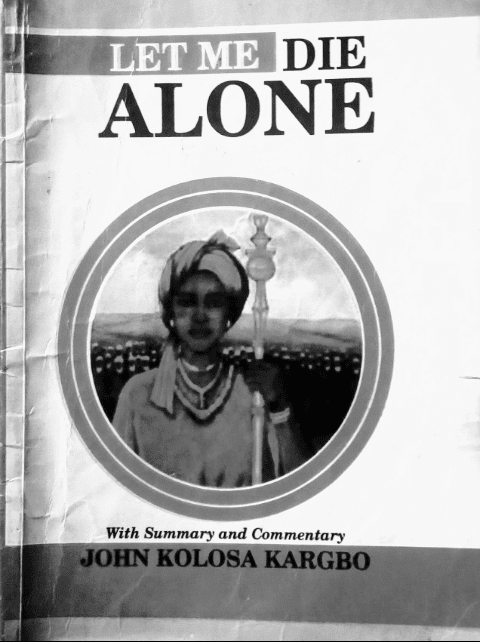In this post, I shall briefly examine the characters in Ola Rotimi’s The Gods are not to Blame and the roles each character plays in the play.
The characters being focused on are King Adetusa, Queen Ojuola, King Odewale, Aderopo, Ogun Priest, Baba Fakunle, Abero, Alaka, and Gbonka.
Let’s delve right into it.
King Adetusa
He is the husband of Queen Ojuola and father of Odewale and Aderopo. King Adetusa is the king of Kutuje before the ascension of Odewale to the same throne. He meets a tragic death in the hands of a son he doesn’t know exist.
The presence of his murderer in Kutuje would bring deaths and illnesses to the land twelve years after his death.
Judging from his confrontation with Odewale in the latter’s farm in Ede, King Adetusa is well versed in spells and incantations.
Queen Ojuola
Ojuola is King Adetusa’s wife and later inherited by Odewale. She is the mother of Odewale and Aderopo. Cruel fate makes her bear four children for Odewale, her son cum husband. She kills herself when she learns that her husband, Odewale, is her son all along.
All through the play, Ojuola projects the image of a patient, reserved, obedient and dutiful wife. She also plays the role of a good hostess.
King Odewale
Odewale is the tragic hero in The Gods are not to Blame. He is the ill-fated child destined to kill his father to marry his mother. Ignorant that by running from his destiny, he is actually being drawn to the course of his destiny, Odewale abandons his foster parents, Ogundele and Mobike.
In Ede, he kills a man who years later turns out to be his biological father. He flees to Kutuje and liberates its people from the captivity of invaders. Odewale is given the throne of Kutuje on a platter of gold on the account of his meritorious contribution to Kutuje Land.
He marries Queen Ojuola, the wife of the former king, and has four kids by her. Odewale is valiant and powerful but hot-tempered. As a king, Odewale is a good and attentive leader save his anger and trust issues. He motivates his people to action. He espouses even in the face of his tragic end that man is the architect of his destiny.
Odewale plucks out his eyes, abdicates the throne, and leaves Kutuje hand in hand with his four children gotten through incest as a self-imposed punishment for the abomination he commits.
Aderopo
Aderopo is Odewale’s brother and the second of the two sons of King Adetusa and Ojuola. He is respectful. Unlike the boastful Odewale, he can differentiate between what should be made public and what shouldn’t. As the prince of Kutuje, he is equally responsible for the welfare of the people.
He is the one sent to Ife to divine the possible cause of the crisis in Kutuje. Back from Ife, he brings with him a riddle that needs to be demystified. Upon his suggestion, he again goes to Oyo to bring the blind seer, Baba Fakunle, to clear the air of mystery.
Out of no fault of his, Aderopo is banished from the palace by King Odewale who in his distrust supposes Aderopo is in connivance with those who want to snatch his throne. The mantle of leadership will later fall on Aderopo after the tragic ends of Odewale and Ojuola.
Ogun Priest
The Ogun Priest is a regular in the palace of Kutuje. It is at his shrine that Odewale’s destiny is divined. He is the one that ties cowries around Odewale’s feet and hands, and instructs Gbonka, the king’s special messenger, to take Odewale to the evil grove to die.
During the unveiling of Odewale’s identity, he tries to confuse Alaka and dissuade Odewale from listening to the old man. The reason for his ploy is obvious. He wants to lessen the impact of the truth.
He serves two kings and might as well serve another when Aderopo is installed as the king.
Baba Fakunle
Baba Fakunle is the blind Ifa priest who foretells Odewale’s future to his parents at the shrine of Ogun. His services would later be consulted several years later to reveal the identity of the murderer of King Adetusa. Baba Fakunle accuses Odewale of being the murderer and a bedsharer.
Abero
Abero is King Odewale’s second wife.
Alaka
Alaka is Odewale’s childhood acquaintance with whom Odewale shares fond childhood memories. He is an Ijekun man and Hunter Ogundele’s apprentice.
He searches for Odewale many years after his disappearance to tell him of his father’s death. He is the first person Odewale tells about the murder at Ede.
He is in fact the one who initiates the unravelling of Odewale’s identity. He tells Odewale that he is not the biological son of Ogundele and Mobike and that he is in actual fact a Kutuje man. He narrates how Odewale is given to his master, Ogundele, while they are on a hunting expedition in a bush.
Gbonka
Gbonka is the king’s messenger entrusted with the responsibility of killing Odewale in the evil grove. His pity for the innocent child however blinds him of what the boy is capable of. He couldn’t bring himself to kill him and so spares him. He gives Odewale to Ogundele, a hunter he meets in the forest.
He is also one of the five guards with Adetusa when the king is killed on a farm in Ede. He is the only bodyguard that returns to tell the people of their king’s demise.
Gbonka is sought for in the unravelling of King Adetusa’s murderer. He is also instrumental in the identification of Odewale as the cursed child destined to kill his father and marry his mother.
Read Also:
- Critical Analysis of Ola Rotimi’s “The Gods are not to Blame”
- Memorable Qoutes from Ola Rotimi’s “The Gods are not to Blame”
 WHATSAPP: Click HERE to join the new Literature PADI WhatsApp group to receive latest updates on your phone and for further literary discussions!
WHATSAPP: Click HERE to join the new Literature PADI WhatsApp group to receive latest updates on your phone and for further literary discussions!










